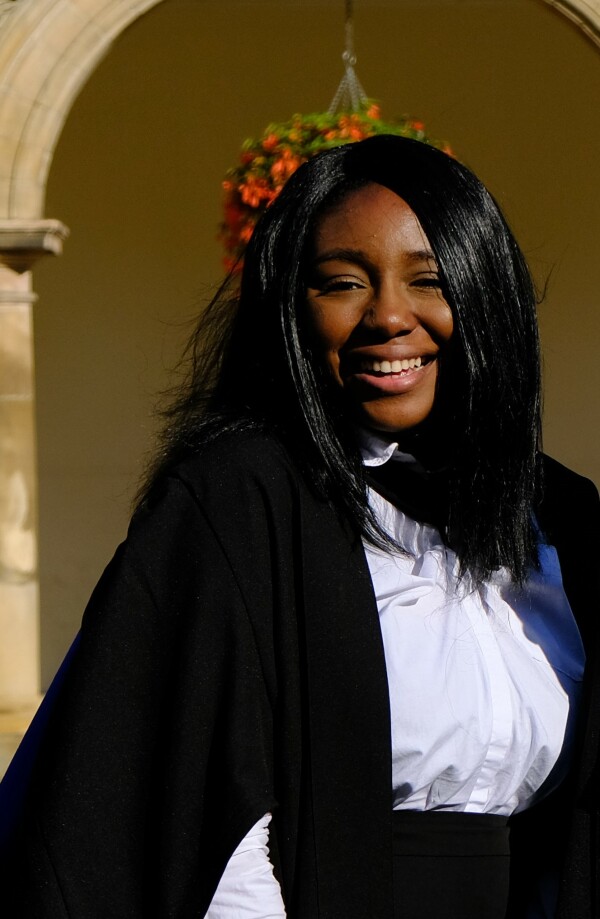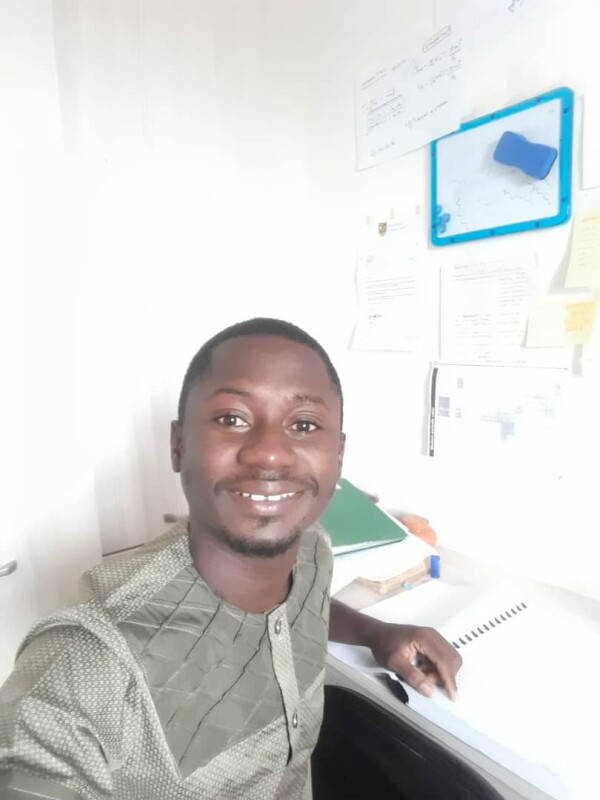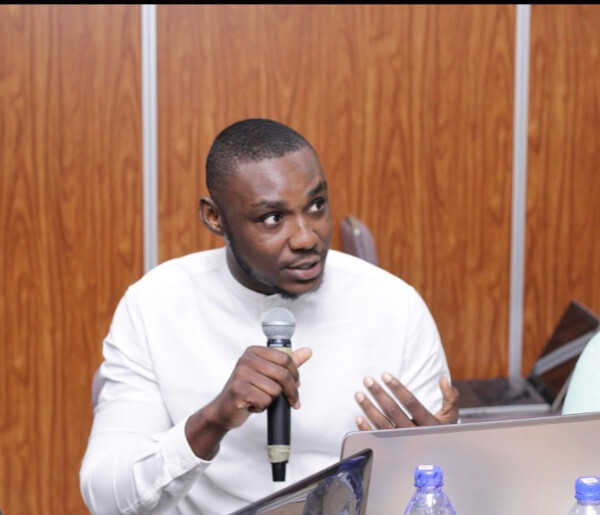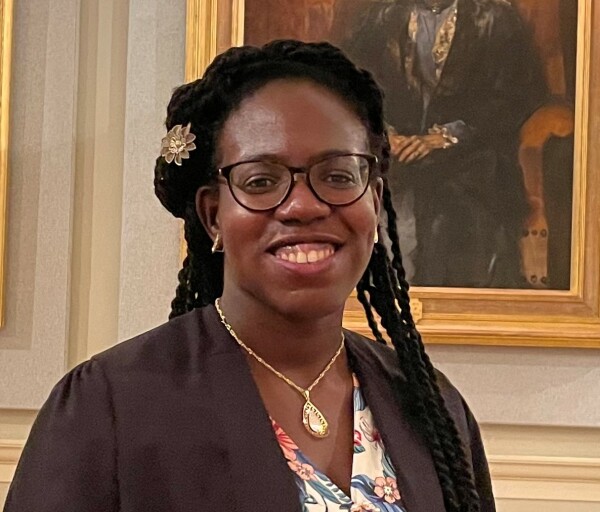Cambridge-Africa Scholars 2021-22
Cambridge-Africa Scholarships are awarded to outstanding applicants from sub-Saharan Africa to pursue full-time postgraduate degrees in any subject available at the University of Cambridge. These scholarships (five a year for seven years) are funded by the University of Cambridge and the Cambridge Trust. Read about the seventh cohort of scholars for the 2021-22 academic year, below.

Kenechukwu Nwagbo
Faculty of Education
Kenechukwu Nwagbo is an emerging education and international development expert from Nigeria, with over 5 years’ experience working in the research, practice and policy of international development. Her research at Cambridge will examine public-private partnerships for education in low-income settings. Before the PhD, Kenechukwu managed global partnerships for development between leading research institutions across the ‘Global South’ and prominent development institutions around the world, including the Executive Office of the UN Secretary General. Her work supporting think tanks and other research institutions across Africa, Asia and Latin America, has contributed to the development of policy briefs, reports and other knowledge products for the UN, USAID, UNDP and IDRC amongst others.
Kenechukwu’s commitment to development has been greatly shaped by her upbringing. Born overseas to Nigerian diplomats, she was introduced to the importance of national service from an early age. A peripatetic upbringing across Europe and Nigeria presented contrasting realities, and the pressing need to understand why the quality of life in terms of education, healthcare and other social amenities, was seemingly better abroad than at home. Consumed by questions relating to the historical, social and economic development of her country, she studied the BA in International and Comparative Politics at the American University of Nigeria, where she graduated at the top of her class, before working to provide education in conflict-affected regions of north-eastern Nigeria. She holds an MPhil in Education, Globalisation and International Development from the University of Cambridge where she studied as a Standard Bank Africa Chairman Scholar, and hopes to build upon her MPhil research by contributing a better understanding of ‘what works’ in providing equitable access to education for all – a key pathway to sustainable development. She is honoured to have been awarded the Cambridge Africa Scholarship, and is delighted to join this vibrant scholar community.
College: Queens’ College
Supervisor: Professor Pauline Rose

Mark Asare Owusu
Department of Veterinary Medicine
A citizen of Ghana, Mark graduated from the Kwame Nkurumah University of Science and Technology in 2018 under the department of Mathematics. After his undergraduate study, he was awarded a scholarship from the Mastercard Foundation to pursue a Masters in Mathematics at the African Institute for Mathematical Sciences (AIMS), in Ghana, in 2019.
During his study at AIMS, he worked on a project titled ‘Mathematical analysis and optimal control measures on Covid-19 considering humans as shedders’ which earned him the ‘Tutors best essay award’ in his year group in 2020.
Mark’s current research is on the Epidemiology and control of meningitis in Ghana: an application of mathematical modelling. This study is in line with the World Health Organization (WHO) objective to defeat meningitis by 2030, especially in Sub Saharan Africa.
Mark has a great interest in using mathematical models to better understand the dynamics of the disease burden to predict realistic control measures while simultaneously figuring out the cost of implementation of these measures so as to maximise health benefits while minimising costs.
Mark foresees that, this work might influence decisions with regards to the WHO’s vision to defeat meningitis by 2030.
Aside his academic activities, Mark is passionate about children’s issues and youth empowerment programs. It is on this note, that in 2019, he established a free piano school for children in his local community of Nkoranza-Akuma, with the aim of nurturing, supporting and unveiling the excellent inbuild capabilities of these children.
College: Wolfson College
Supervisor: Dr Caroline L Trotter.
Dr. Yaw Ofosu Ansong Snr
Department of Engineering
Yaw is a licensed Medical Doctor by profession and a serial entrepreneur. He studied his Bachelor of Medicine and Bachelor of Surgery (Mb ChB) degree at the University of Cape Coast, Ghana. After working as a medical doctor in Ghana for a while, he went on to pursue a degree in Bioengineering (Neurotechnology Stream) at Imperial College London. During this period, he built a Soft Robotic Peristaltic Device for his thesis. Other projects he worked on included leveraging Machine Learning to build a Neural Decoder for moving a hypothetical prosthetic limb of a monkey.
His PhD at the University of Cambridge is a niche intersection of Medicine and Surgery and Engineering. It will involve building an implantable device that will leverage engineering principles for the treatment of Spinal Cord Injuries.
Other than medicine, engineering and entrepreneurship, Yaw enjoys playing sports and writing music.
PhD Supervisor: Dr. Christopher Proctor
College: Lucy Cavendish College

Mohammed Zayan Imoro
Institute of Criminology
Mohammed Zayan Imoro is a Ghanaian pursuing a PhD in Criminology at the Institute of Criminology, University of Cambridge. Born and raised in Ghana, Zayan received his bachelor’s degree in Sociology from the Kwame Nkrumah University of Science and Technology (KNUST) in 2016, and in 2018, an MPhil in Development Studies from the Centre of Development Studies, University of Cambridge. His research interests are centered around criminal justice systems and transparency reforms, particularly anti-corruption reforms and their nexus with accountability and political stability.
Before his MPhil, Zayan worked with the Attorney General’s Department and Ministry of Justice in Ghana where he supported with legal research and studies by the Ministry on interagency collaboration. Between 2018 and 2021, He served as a Senior Project Officer with the consulting firm Participatory Development Associates (PDA) Ghana where he led the Advocacy and Communications Team on a wide range of projects including the Public Sector Watch Initiative and Strengthening Community-Based School Governance Project. He also co-led the Mastercard Foundation’s (MCF) Safeguarding Support project and put together the communication strategy for the MCF Impact Partner Project. Zayan is co-editor of the maiden Report on the State of Child Protection in Ghana, and former convenor of the Knowledge Sharing Workshop on Child Protection in Ghana. He has also served as a project consultant for organizations including Action Aid Ghana, Jacob West Ghana Ltd and the Hacklab Foundation.
Zayan’s doctoral research aims to understand how anticorruption reforms are institutionalized, and the factors that facilitate or impede the effective functioning of these institutions. The study focuses specifically on specialized anti-corruption agencies (ACAs) and transparency reforms such as right to information laws. It will assess the impact of power on how the institutions emerge, and then on how they are enforced. Situated at the intersection of governance reform, criminology and institutional studies, the study aims to address theoretical and geographical gaps in the anticorruption literature while exploring entry points for sustainable and effective long term governance reforms.
Supervisor: Dr. Justice Tankebe
College: Christ’s College

Miss Chisom Ifeobu
Department of Engineering
Born and raised in Nigeria, Chisom obtained her undergraduate and Master’s degrees from the University of Cambridge in 2020. During an internship at Shell Nigeria in 2018, she was investigating the problem of leakages in the oil and gas industry and became interested in how engineering principles play into biological problem-solving. A concept known as Biomimicry. She suggested a technology based on blood platelets’ functioning that could save millions of pounds in costs to the company. This process of applying knowledge found in nature to propose engineering solutions particularly intrigued her.
This interest drove her to study how fruits withstand loads on impact in hopes of providing a model for better load mitigating structures during a research internship at Cambridge University the next year. During her Master’s project, she described the mechanical behaviour and structure of a typical horse chestnut fruit population by combining her prior knowledge of engineering principles with newly acquired biology knowledge and biomimetic design.
By far the greatest challenge she faced during her studies was completing the last three months of her project at home, where power outages are common, due to the pandemic. As she struggled, she became enlightened to the urgent need for sustainable development initiatives to tackle problems plagued by countries like her own. Despite these challenges, she achieved a 1st class result. She then made it her goal to pursue a career in research and advance renewable energy technologies on the African continent. As a Cambridge-Africa scholar, she will be conducting research on the cyclic loading of onshore wind turbine foundations focusing on optimising their design to drive down costs and make their construction more sustainable thereby reducing the barrier to their adoption in African countries.
PhD supervisor: Dr Christelle Abadie
College: Newnham College

